My Baby’s Mouth Is Always Open. Is It an Autism Indicator?
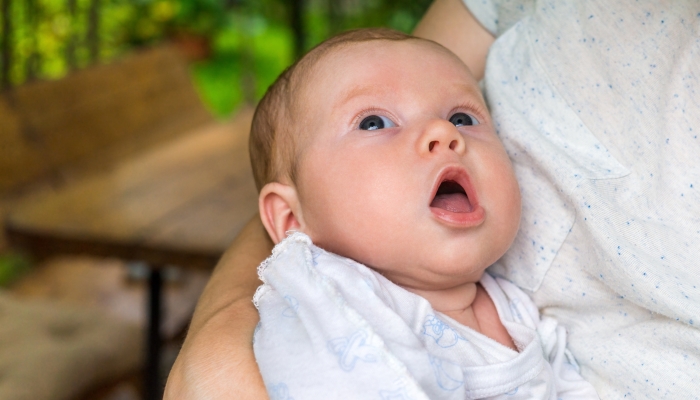
- There are a variety of autism indicators that can pop up throughout child development.
- Some parents worry if their baby’s mouth is always open and wonder if it’s a sign of autism.
- Research does not show a definitive link between an infant keeping their mouth open and autism if there are no other symptoms.
- There are a variety of reasons why an infant’s mouth may stay open, including a stuffy nose, sleep apnea, a deviated septum, and allergies.
- Regardless of the cause, talk with your pediatrician and find out what is going on.
Parenthood is a journey marked by numerous milestones, each moment filled with awe and curiosity. However, amidst the joys, parents often find themselves concerned about certain behaviors in their babies. One such concern is an infant constantly keeping their mouth open.
This seemingly innocuous behavior can trigger worries for parents hoping it’s not anything significant. You may have heard that an infant keeping their mouth open could be linked to autism, which can be concerning as a new parent.
While that possibility can make a parent’s mind race, rest assured that there are a variety of reasons your baby might keep their mouth open that aren’t directly linked with autism.
Mouth Open: A Direct Link to Autism?

Research, anecdotal evidence, and case studies offer valuable insight into figuring out the link between certain behaviors and autism.
At first glance, some sources make no mention of mouth behaviors when talking about autism. But some studies do specifically mention and look at mouth behaviors and their possible link to autism. Should you find some information through research of your own, always bring it to your pediatrician to help shape your child’s care.
Research Perspective
Your infant has many milestones to reach for and achieve as they grow. It’s important to remember that these milestones for your infant are tied to how old they are. Research has shown that certain behaviors, or a lack thereof, at each milestone in infants and children are possibly linked to autism.
The CDC lists a variety of signs and symptoms of autism. While there is no mention of a constantly open mouth being linked to autism on that list, some clinical studies have data saying that there could be a possible link.
Clinical Studies
Some clinical studies, including a 2023 study11. Hall, A., Maw, R., Iles-Caven, Y., Gregory, S., Rai, D., & Golding, J.. Associations between autistic traits and early ear and upper respiratory signs: a prospective observational study of the Avon Longitudinal Study of Parents and Children (ALSPAC) geographically defined childhood population. BMJ Open. 2023;13(3). https://doi.org/10.1136/bmjopen-2022-067682 published in the British Medical Journal, have found a possible link between mouth breathing and autism.
However, there are also other symptoms grouped in with mouth breathing. This brings up the question of is mouth breathing by itself related to autism or if it’s simply happening alongside something else that is linked to autism.
Newborn and Infant Mouth Behavior: The Basics

As infants grow, their motor skills are continuously improving. While most think of babies learning to walk and grab things, their mouth behavior also changes as they grow.
Typical Mouth Behaviors in Infants
Babies exhibit a range of mouth behaviors as they grow and develop. These activities can include:
- Sucking
- Rooting
- Mouthing
- Teething
- Babbling
- Sticking their tongue out
- Lip smacking
- Mouth Breathing
Let’s talk about nasal breathing vs. mouth breathing first.
Nasal Breathing vs. Mouth Breathing
Babies mostly breathe through their noses, as the structures in the nasal passages provide several benefits to them.
Tiny hairs in their nose, called cilia, help filter out dust, bacteria, and other particles from the air and keep them out of their lungs. Bony structures in the nasal passages called the nasal turbinates help circulate, warm, and humidify air as it goes into the lungs.
When babies aren’t breathing through their noses, they miss out on these benefits. However, if your infant has something creating nasal congestion, such as a respiratory infection, it makes sense that a baby would breathe through their mouth.
Oral Motor Development
Beyond breathing patterns, babies employ their mouths to explore the world. The sucking reflex, drooling, and mouthing objects serve as crucial developmental milestones.
These actions facilitate sensory exploration, allowing infants to comprehend their environment through taste, touch, and temperature sensations. This also helps them to develop oral motor skills.
Why Some Babies Keep Their Mouths Open

Several factors contribute to open-mouth behavior in infants, such as:
- Illness
- Sensory exploration
- Teething discomfort
- Problems in their upper airway
- Your child’s lower facial features
- Pediatric obstructive sleep apnea
Illness
Babies can unfortunately suffer from allergies and respiratory illnesses. If your baby’s allergies or respiratory illness is causing excess mucus, then open mouth breathing is expected.
Sensory exploration
Remember that babies also use their mouths to explore the world, so if they are chewing on objects or thumb-sucking, then their mouths staying open while doing those things is also expected.
Teething Discomfort
Teething can be a painful experience for your child. The ache they feel in the mouth and gums as their new teeth erupt can cause them to drool more than normal and be generally fussy.
While babies love to chew on objects whether or not they are teething, they may chew even more often during this time. Some babies even chew on their tongues during this time!
Upper Airway Problems
There may be some malformation or blockage in your baby’s upper airway that could be causing your baby to be a mouth breathe.
Enlarged adenoids (tissue found between the back of the nose and throat) and enlarged tonsils (tissue found in the very back of the mouth) can cause trouble breathing by narrowing the upper airway. A deviated septum (the structure that separates each nostril) can also cause upper airway narrowing.
There are also causes for temporary nasal obstruction, such as excess mucus stopping up your child’s nose or the insertion of a small foreign object into their nose. Should it be a small foreign object, seek medical help to safely and properly remove it.
Lower Facial Features
Your child’s lower facial features can contribute to open mouth breathing. Chronic upper airway problems, like enlarged adenoids or tonsils, can shape the way your baby’s mouth rests since they cause difficulty breathing through the nose. Without treatment, those problems can lead to something called open mouth posture.
Open mouth posture is where the lips don’t naturally rest together and instead rest slightly apart from each other, leading to a chronically open mouth. This open mouth posture is associated with chronic mouth breathing and tends to lead to dry lips, which can be unpleasant for children to deal with.
A problem like open mouth posture will take help from your pediatrician and doctor who specializes in oral problems to help treat.
Tongue thrust, not to be confused with a baby simply sticking their tongue out, is a problem where the tongue lays too far forward at rest, during speech, and swallowing. This improper positioning of the tongue can cause an open bite, which will require the help of an orthodontist to help correct it.
Pediatric Obstructive Sleep Apnea
Normally during sleep, a baby sleeps with their mouth closed and breathes through their nose. If there is something that is making nose breathing difficult, you may notice mouth breathing instead. You will want to treat whatever is causing the baby’s mouth breathing if this is the case.
With pediatric obstructive sleep apnea, something is obstructing their airway and causing their breathing to stop momentarily. Over time, this can lead to the same problems that adults can have, such as high blood pressure.
A pediatrician will be the one to diagnose this, so if you notice your child mouth breathing during sleep or notice your child stops breathing momentarily during sleep, bring it to their attention.
Thankfully, should your child suffer from obstructive sleep apnea, there are methods to help counter it, such as positive airway pressure therapy.
Autism Spectrum Disorder: Early Indicators
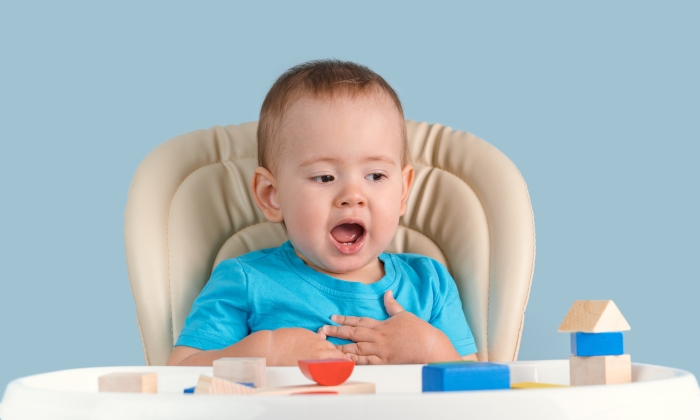
As a parent, you’re likely always on the lookout for possible issues your baby may run into as they grow. Autism may not be as noticeable as some diseases or issues, but it does have early indicators to be aware of.
What is Autism?
The Centers for Disease Control and Prevention (CDC)22. Centers for Disease Control and Prevention. Signs and Symptoms of Autism Spectrum Disorder. Centers for Disease Control and Prevention. 2022. https://www.cdc.gov/ncbddd/autism/signs.html states that autism spectrum disorder, or autism, is “a developmental disability caused by differences in the brain.” These differences in the brain can make social communication more difficult, influence behaviors, and change how someone interacts with the world around them.
Recognized Early Signs of Autism
Early signs of autism encompass various challenges in social interaction, communication, and behavior. Avoidance of eye contact, lack of response to their name, and delayed babbling are prominent red flags. Repetitive behaviors, such as hand-flapping and rocking back and forth, further characterize this neurodevelopmental disorder.
Open-mouth behavior, when observed in conjunction with these signs, can provide valuable context for healthcare professionals and parents alike.
Not all signs and symptoms of autism are commonly thought of by most people. The CDC has a great list of signs and symptoms of autism to look through and also offers screening and diagnostic guidelines33. Centers for Disease Control and Prevention. Screening and Diagnosis of Autism Spectrum Disorder. Centers for Disease Control and Prevention. 2022. https://www.cdc.gov/ncbddd/autism/screening.html .
A Holistic Approach to Observation

It can be daunting trying to tell the difference between a behavior that may justify calling the pediatrician and one that’s normal for a developing baby. To help relieve some of that stress, think about your baby’s behavior in regards to their developmental milestones and what else is happening alongside that behavior.
Viewing Behaviors in Context
It’s imperative to view open mouth behavior within the context of a child’s overall development and current health status. Illness and airway problems can be the cause of the open mouth breathing. Consider what other behaviors are displayed alongside constantly open mouths and at what age they are being displayed.
Developmental Milestones
Monitoring developmental milestones is an integral part of parenting. While minor delays can happen, multiple and/or large delays in reaching developmental milestones could be a cause for concern. Informing your pediatrician when you notice these delays can ensure that your child receives the necessary support for their unique developmental path.
Seeking Expertise and Guidance

Even with developmental milestones and the context of your baby’s behavior in mind, you may still feel the need to talk to your pediatrician.
When and Why to Consult a Specialist
If your baby is starting to display potential early signs of autism, then it’s important to bring this up to your pediatrician. Your pediatrician will be able to help screen your baby for autism and determine if they have autism.
Should they have it, the pediatrician will be able to help your baby get into early intervention programs. These early intervention programs consist of multi-disciplinary groups working together to help determine what symptoms your child has and work on dealing with those symptoms or alleviating the root cause of a symptom if possible.
These early intervention programs and their availability can vary from state to state, so it would be important to see what and where these programs are available to you.
Preparing for a Consultation
Preparing for a consultation involves active participation from parents. You may be asked to start a behavior diary or journal, which can provide a valuable timeline of behaviors to you and healthcare professionals. This detailed record enhances the accuracy of assessments, aiding specialists in devising appropriate intervention strategies.
Open mouth behavior in babies is a complex phenomenon with multiple causes. While it might raise concerns, it’s not automatically a direct indicator of autism. The context for why your child has a constantly open mouth is key.
Every child’s developmental path is unique, and with close attention to developmental milestones and accurate, timely updates to their pediatrician, they can grow up to be the best version of themself!
FAQs
How can parents differentiate between typical baby mouth behaviors and potential autism indicators?
Context is important when it comes to telling the difference between normal and abnormal mouth behaviors.
For example, if your child is visibly sick and creating excess mucus, then open mouth breathing while awake and asleep could be expected. If your child isn’t sick or doing something that requires their mouth and is open mouth breathing, then you would want to contact your pediatrician to see what the cause is.
What is the difference between autism and global developmental delay?
Autism is described by the CDC as “a developmental disability caused by differences in the brain.” Global developmental delay is a different condition in which your infant fails to reach developmental milestones on time. They can share some signs and symptoms.
References
- Hall, A., Maw, R., Iles-Caven, Y., Gregory, S., Rai, D., & Golding, J. (2023). Associations between autistic traits and early ear and upper respiratory signs: a prospective observational study of the Avon Longitudinal Study of Parents and Children (ALSPAC) geographically defined childhood population. BMJ Open, 13(3). https://doi.org/10.1136/bmjopen-2022-067682
- Centers for Disease Control and Prevention. (2022, March 28). Signs and Symptoms of Autism Spectrum Disorder. Centers for Disease Control and Prevention. https://www.cdc.gov/ncbddd/autism/signs.html
- Centers for Disease Control and Prevention. (2022, March 31). Screening and Diagnosis of Autism Spectrum Disorder. Centers for Disease Control and Prevention. https://www.cdc.gov/ncbddd/autism/screening.html
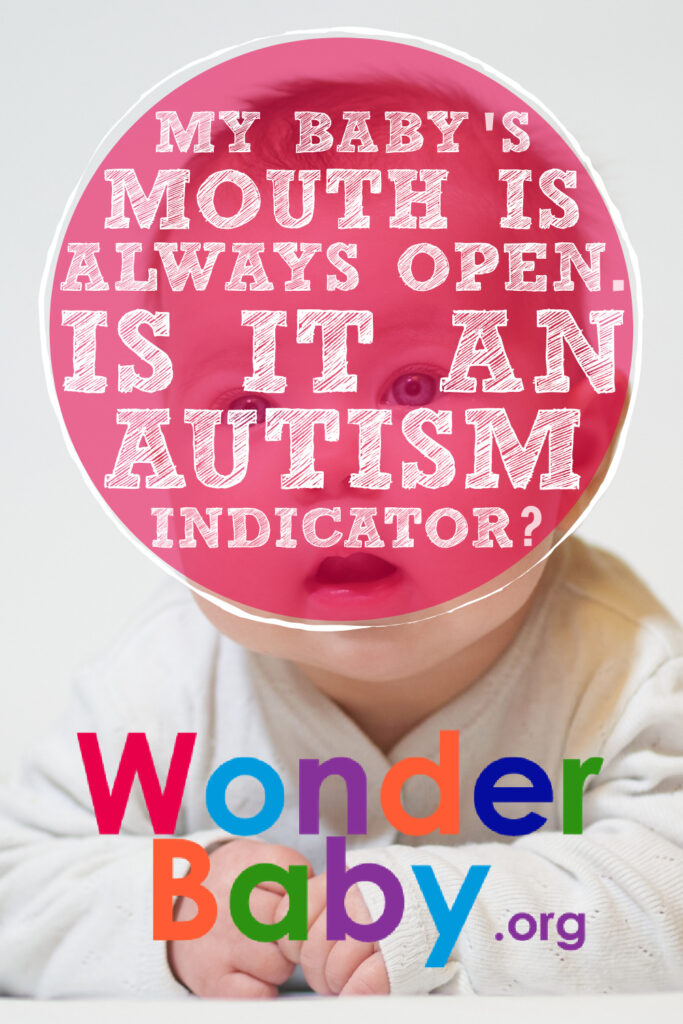
The information WonderBaby provides is not intended to be, and does not constitute, medical or other health advice or diagnosis and should not be used as such. Always consult with a qualified medical professional about your specific circumstances.
Related Posts

Development, Special Needs
How to Track Milestones for Developmentally Delayed Babies
Parents of developmentally delayed babies can explore practical tools and strategies to track milestones, celebrate progress, and support their child’s unique developmental journey.
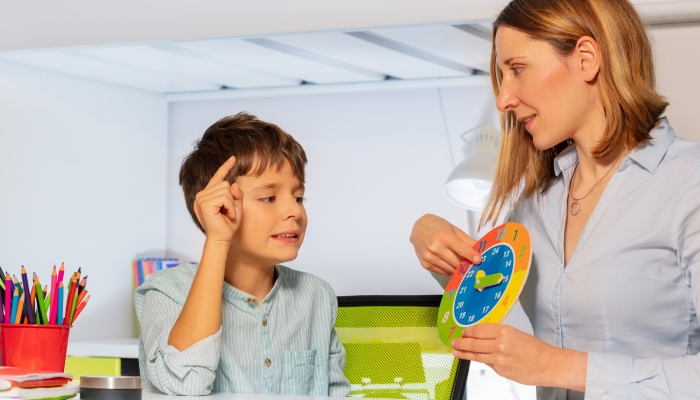
Autism
Developing Time Management Skills in Children with Autism: 7 Tips
Learn how you can use structure and visual aids to help your child with autism learn time management skills.
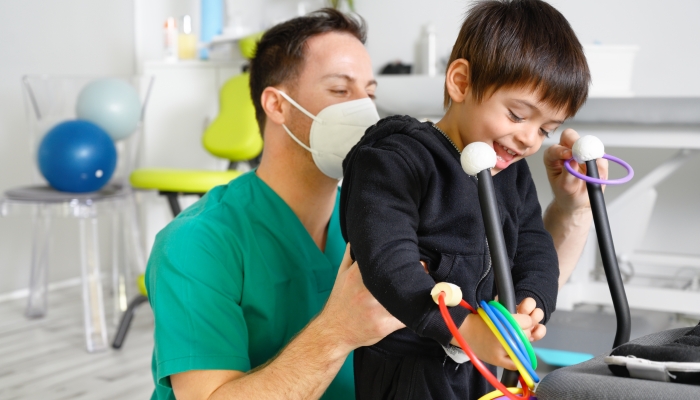
Autism
Occupational Therapy for Children with Autism: How It Can Make a Difference
Children with autism face challenges in many different areas. Occupational therapy can help children address these difficulties while having fun!